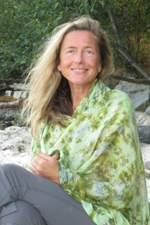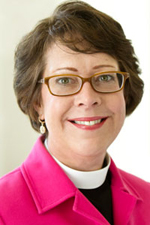This week marks the first session of a 10-week initiative, "Theologians Losing to Gain," where students at Emory's Candler School of Theology and Rollins School of Public Health will get advice, direction and incentive towards establishing patterns for a healthy lifestyle.

"Theologians Losing to Gain" is about forming self-care, says student organizer Trey Comstock.
"The overall idea is not just about weight loss, but about forming self-care," says Trey Comstock, a dual student at Candler and Rollins and an organizer of the 2nd annual Theologians Losing to Gain. "What happens to the physical self is intimately related to every part of our being."
Candler students are committed to the care and improvement of society, says Comstock, but as they balance academic studies and work in ministry, time for personal self-care can get squeezed out. The workshops reinforce Candler's commitment to providing ways for students to engage their physical health in ways which spotlight the body's connection to the mind and soul.
Self-care helps pastors care
As a pastor, Comstock recognizes the connection between personal self-care and his relationship with his congregation. On his path towards a healthy lifestyle, Comstock credits his congregation as a key factor for improvement.
"As a pastor, the focus is on caring for our congregation, and committing to a healthy lifestyle is a better way to live a healthy life in totality," says Comstock, "To ignore my physical health is to ignore a key aspect of living the full aspect of life in Christ."
Weekly check-ins
This year, Theologians Losing to Gain will assist 30 to 40 students on their path to healthier lifestyles by presenting them with various health tips, weekly exercises and a few weigh-ins throughout the 10-week period.
Every week, participants will receive emails where weekly goals and advice will be provided. Within each email will be the competitive element of acquiring points through challenges offered by the program.
Challenges can involve an exercise, like holding a plank, or tracking your meals for the week. Completing challenges earns points for students to track online. For people interested in weight loss, there will be a weigh-in every other week, but weight loss does not have to be someone's main incentive for joining the program.
It's about stewardship

Instructor Ingrid Hauss teaches yoga as a form of interactive art and body prayer.
While weight loss is a goal for many, the general theme of participants' interest this year is stewardship. Students' applications showed that many participants hope to find ways to improve being a good steward of their bodies.
"Physical health is a key part to spiritual health as well," says Comstock. "We tend to artificially separate the three, mind, body and spirit, but they enrich each other."
Similarly, Candler's Office of Student Programming recognizes the threefold connections between mind, body, and spirit and the importance of caring for students' holistically during their time in seminary. With events such as "Poor Seminarians Cooking Demos" and "Seeking Sanity in Seminary," the office strives to make accessible the resources needed to find balance and rhythm in the midst of busy schedules.
Recently, initiatives out of the student programming office have focused on practices of spiritual formation.
"What I have been trying to do is create, structurally and programmatically, ways in which we can continue to educate students how they can grow spiritually in a holistic way," says Ellen Echols Purdum, assistant dean of student life and spiritual formation. "For the past two years at student orientation, we have an introduction into practices of spiritual formation. We heard a great response from students on activities with movement, including yoga and African dance."
With this feedback, the office organized a recent workshop on yoga as a form of interactive art and body prayer. Led by Vancouver yoga instructor Ingrid Hauss, Candler students and faculty participated in an interactive experience where artwork, yoga and prayer were combined for a holistic form of meditation. In one session, Hauss led students through a form of the Lord's Prayer where each line of the prayer connected to a movement of yoga and a piece of art sketched by Hauss.
Connecting with ancient practices

The Rev. Ellen Echols Purdum is assistant dean of student life and spiritual formation at Emory's Candler School of Theology.
One goal of the workshop was to help students' connect what they are learning about church history to current spiritual practices.
"Prayer with the body is an ancient practice of Christianity," says Purdum. "The ancient desert fathers and mothers were out praying with their entire body with fingers extended saying, if you want you can become all flame. After the split of the church into East and West, the West understands prayer as only a mental practice."
Purdum wants to continue to highlight the body and movement. In March, she will accompany a group of students to the Green Bough House of Prayer in Adrian, Ga., for a silent prayer retreat. Purdum credits the opportunity to be in silence, enjoy fresh, prepared meals as a group and walk in an outdoor labyrinth as the highlights of this trip, which leaves her with more applicants than available spots each year.
Ultimately, Purdum hopes to provide "more opportunities for students to find the rhythm of study, prayer and leisure in their time at seminary. With new students every two or three years, we are always going to come back to helping students find the rhythm of life, wherever they can do it."
